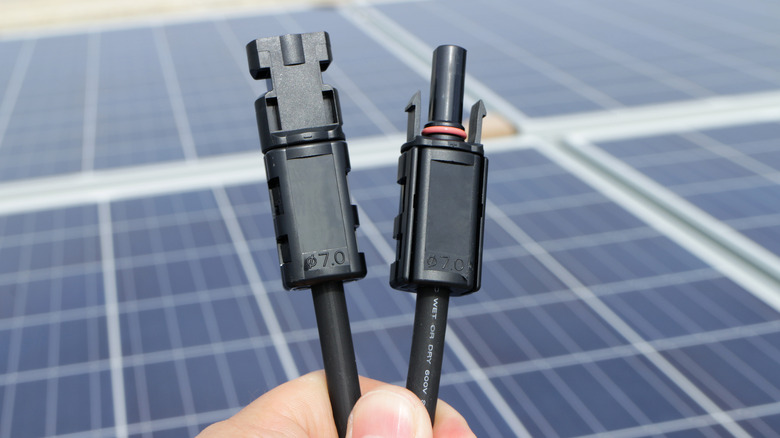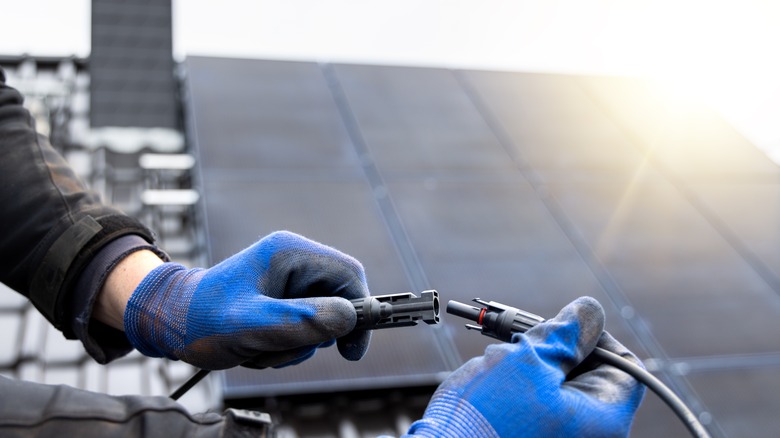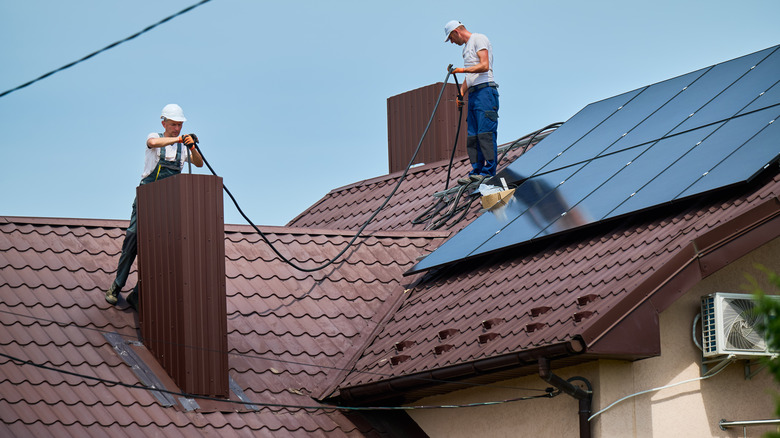Solar Panel Connectors: What Are The Different Types And Are They Universal
From assessing whether your home is a good candidate for solar energy to figuring out how solar panel tax credits work, a lot goes into setting up a solar power system for a home. However, one of the most important components — solar panel connectors — is often the least talked about. The average photovoltaic (PV) system can require more than 100 of these connectors, which connect solar panels together and to other PV components, including solar panel inverters, charge controllers, and batteries. Once they're locked in place, they ensure energy travels securely and efficiently throughout the system while minimizing the risk of power outages.
Since solar panel connectors are exposed to a range of harsh conditions, including extreme weather, they're designed to be waterproof and UV-resistant. High-quality connectors should hold up for the lifetime of your solar power system, around 25 to 30 years. While there are several types of connectors available for solar arrays, the MC4 connector has become the industry standard. Still, it's important to understand the different types of connectors to ensure you use the right one for your system.
Types of solar panel connectors
Becoming familiar with the most popular types of solar panel connectors will help you choose the best one for your needs. Just like solar panels have changed over the years, solar panel connectors have become more secure with optimal wiring configurations for solar arrays. MC4 connectors are by far the most common in the solar industry today. It has become the industry standard for many reasons, including its high reliability and ease of use. Its design features a single-contact cylindrical plug and socket shell design that helps it maintain secure and stable electrical connections. These connectors also have a built-in locking mechanism that prevents accidental disconnections, making them ideal for both residential and commercial solar installations. They work with a wide range of solar systems and are waterproof, dustproof, and UV-resistant.
Other connectors include the MC3, which was commonly used but has been phased out in favor of the more advanced MC4 connectors. The MC3 is an older version of the MC4 with a simpler design. It lacks the locking mechanism of the M4, so it's at greater risk of accidental connections and electrical arcing. In the early 2000s, Tyco SolarLok connectors were popular, but like the MC3, they've been replaced by more advanced connectors like the MC4. Besides the MC4 Tyco SolarLok and M3, there's the Helios H4 connector, which is compatible with the MC4 and features a quick-locking mechanism for secure and efficient connections. Another connector that fell out of use was the Radox connector because it didn't meet the US National Electrical Code standards.
Are solar panel connectors universal?
While saying that solar panel connectors are universal would be a bit of a stretch, the widespread use of the MC4 has created a de facto universal industry standard. Before MC4 connectors became standard, homeowners had to choose between MC3, SolarLok, and other connectors, which sometimes resulted in compatibility issues and difficulties during installation and maintenance. This uncertainty is what led to the industry establishing the MC4 standard that would work with all PV modules. You'll find MC4 connectors in almost all modern solar panels and related equipment like power optimizers and microinverters, allowing you or a solar installer to easily replace panels and components without running into compatibility issues.
MC4 connectors are also compliant with the National Electrical Code (NEC). While the proprietary MC4 connector has become the de facto standard for the solar panel industry, it's important to point out that no true standard exists yet, and experts in the space recommend using the same type of connector throughout solar panel arrays to reduce the risk of fires and other issues. With that in mind, users should be wary of using a mix of connectors, even if they claim to have intermateability with one another.


